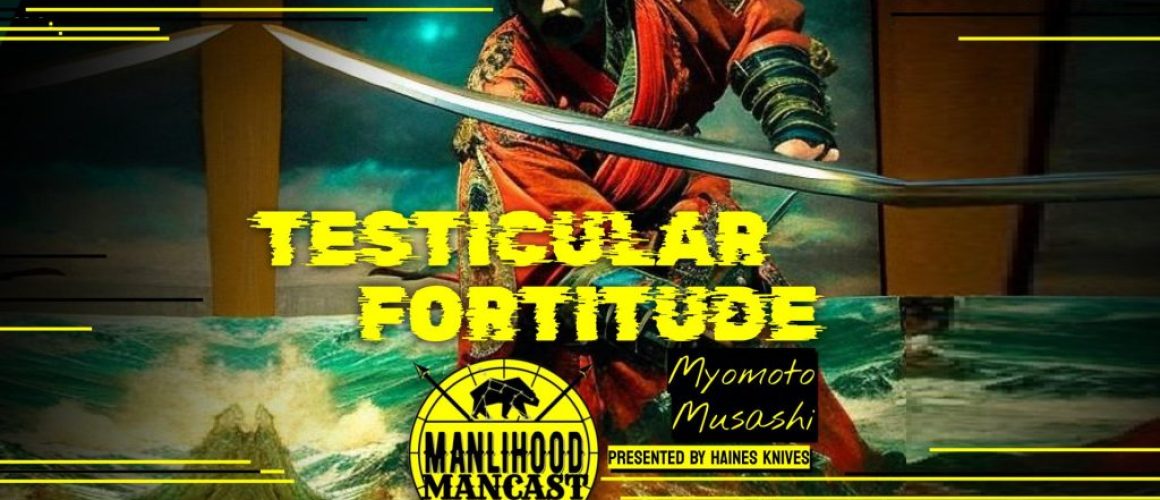Testicular Fortitude | Miyamoto Musashi
He killed a man in combat when he was 13 years old. He was one of the fiercest Japanese warriors of his day, and he also created and perfected an art form.
This Episode of Testicular Fortitude is Brought To you by HAINES KNIVES
Find your new favorite knife at http://HainesKnives.com/mancast or follow on social media @birdforge

Enter our Valentine’s Day Contest and win a DATE NIGHT and HANDCRAFTED JEWELRY FROM JAWBONE & HONEY and HAVEN DESIGNED | http://manlihood.com/contests
Testicular Fortitude means having deep seated masculine courage and strength. Balls. Guts. Manlihood.
Testicular Fortitude on the Manlihood ManCast is where we take a look at men who have beat the odds, men whose courage has left a lasting legacy.
Testicular Fortitude
Do you have testicular fortitude? Do you want to embrace your life of courage? Join our elite group of powerhouse men who are changing the world. http://Manlihood.com/brotherhood
Todays’ man with Testicular Fortitude is Miyamoto Musashi.
He is also known by the names Miyamoto Masana or Niten.
Born in 1584 in feudal Japan, Musashi began fighting as a warrior very young.
At the Battle of Sekigahara in 1600, his fellow soldiers lost – which made him a ronin.
A ronin was a masterless samurai.
They were like the Wild West Gunslingers of the American West– soldiers for hire, duelists, and mercenaries. They were competitive, sometimes hired to protect, but usually they fought for their own honor, rather than someone else’s.
He worked toward mastering his skills with the sword. His goal was to create the perfect sword technique, and what he created would become known as kensai. Kensai is a fencing style with two swords.
Musashi fought and won more than 60 sword duels, many to the death.
On one occasion, the youthful Musashi traveled to Kyoto to fight the master at the Yoshioka family school of martial arts. He arrived late, but the duel went on. It was not a battle to the death, but a wooden sword duel. One blow from Musashi and Yoshioka Seijuro was out of the fight with serious injury to his shoulder and arm.
Seijuro resigned from teaching and became a monk. His status and honor as master had been skunked by a young man.
The new head of the family challenged Musashi.
Musashi arrived late again, but killed him with a blow to the head
.
Now, the Yoshioka family, dishonored by Musashi’s prowess in battle, invited Musashi to another duel with the new head of the family, a 12 year old boy. They knew he had been late to the last two duels, so they plotted an ambush.
This time, though, Musashi arrived early, and saw the family setting up the ambush.
He attacked and killed the boy, and then victoriously fought his way through the mob of mercenaries that meant to kill him.
In 1612, Musashi’s most notorious duel was fought against Sasaki Kojiro.
His rival was known to be as good if not better of a swordsman as himself.
The battle was fought on a remote island off the coast. As they rowed out to the battleground, Musashi carved a wooden sword from his oar. And then, entering the fight, quickly killed Kojiro with a strike to the head with the wooden sword.
Musashi knew it was time to “quit while he was ahead,” and retired from sword fighting.
He did go on to train other swordsmen, and write a very well known war strategy known as The Book of Five Rings.
That book would go on to inspire and inform many warriors, and later western business executives in the 1970s after it was translated to English.
His writings are full of inspiration, motivation, and a perspective which sounds as though it could have been written today as much as in the 15th century.
Listen to these pieces of wisdom from Musashi
“There is nothing outside of yourself that can ever enable you to get better, stronger, richer, quicker, or smarter. Everything is within. Everything exists. Seek nothing outside of yourself.” -Miyamoto Musashi, The Book of Five Rings
“From one thing, know ten thousand things.” -Miyamoto Musashi, The Book of Five Rings
“Today is victory over yourself of yesterday; tomorrow is your victory over lesser men.” -Miyamoto Musashi, The Book of Five Rings
“You must understand that there is more than one path to the top of the mountain.” -Miyamoto Musashi, The Book of Five Rings
“The ultimate aim of martial arts is not having to use them.” -Miyamoto Musashi, The Book of Five Rings
“Think lightly of yourself and deeply of the world.” -Miyamoto Musashi, The Book of Five Rings
“All men are the same except for their belief in their own selves, regardless of what others may think of them.” -Miyamoto Musashi, The Book of Five Rings
“The only reason a warrior is alive is to fight, and the only reason a warrior fights is to win.” -Miyamoto Musashi, The Book of Five Rings
“Truth is not what you want it to be; it is what it is, and you must bend to its power or live a lie.” -Miyamoto Musashi, The Book of Five Rings
Musashi was also known as an artist.
He was skilled at the art of Sumi-e – a monochromatic painting style originating in Japan.
His paintings Koboku meikakuzu (“Shrike Perched in a Dead Tree”) and Rozanzu (“Wild Geese Among Reeds”) are his most well known.
Miyamoto Musashi was truly a warrior poet. He lived in a brutal time – and served it well. He fought for honor, but he also fought for beauty. The same hands that spilled blood were skilled with ink. The same clear head that he used to fight bravely was the same clear head that taught warriors and businessmen alike to achieve their goals.
While the idea of a “Renaissance Man” may be a western concept, Musashi modeled it in the east.
For his courage, consistency, innovation, creativity, and life-changing words – we salute Miyamoto Musashi’s Testicular Fortitude.




